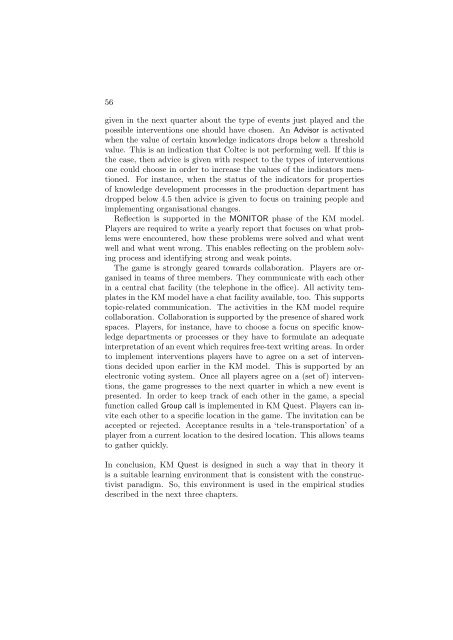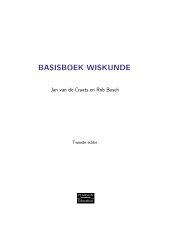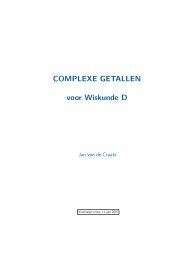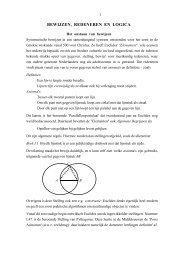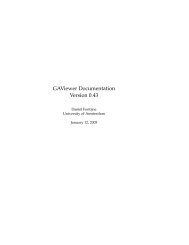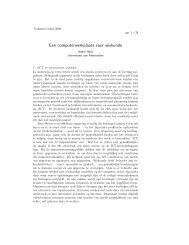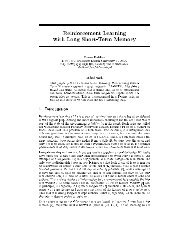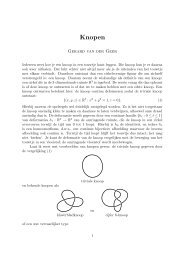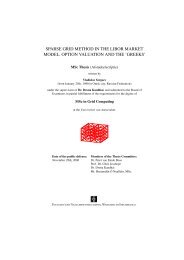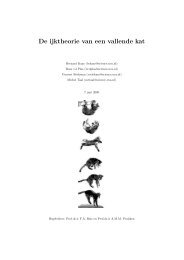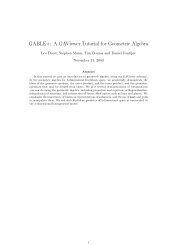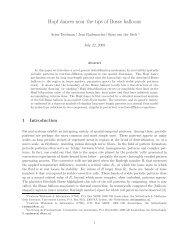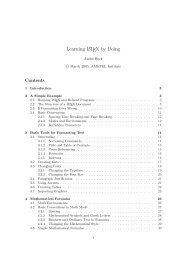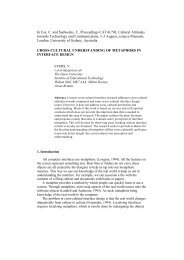The role of metacognitive skills in learning to solve problems
The role of metacognitive skills in learning to solve problems
The role of metacognitive skills in learning to solve problems
Create successful ePaper yourself
Turn your PDF publications into a flip-book with our unique Google optimized e-Paper software.
56<br />
given <strong>in</strong> the next quarter about the type <strong>of</strong> events just played and the<br />
possible <strong>in</strong>terventions one should have chosen. An Advisor is activated<br />
when the value <strong>of</strong> certa<strong>in</strong> knowledge <strong>in</strong>dica<strong>to</strong>rs drops below a threshold<br />
value. This is an <strong>in</strong>dication that Coltec is not perform<strong>in</strong>g well. If this is<br />
the case, then advice is given with respect <strong>to</strong> the types <strong>of</strong> <strong>in</strong>terventions<br />
one could choose <strong>in</strong> order <strong>to</strong> <strong>in</strong>crease the values <strong>of</strong> the <strong>in</strong>dica<strong>to</strong>rs mentioned.<br />
For <strong>in</strong>stance, when the status <strong>of</strong> the <strong>in</strong>dica<strong>to</strong>rs for properties<br />
<strong>of</strong> knowledge development processes <strong>in</strong> the production department has<br />
dropped below 4.5 then advice is given <strong>to</strong> focus on tra<strong>in</strong><strong>in</strong>g people and<br />
implement<strong>in</strong>g organisational changes.<br />
Reflection is supported <strong>in</strong> the MONITOR phase <strong>of</strong> the KM model.<br />
Players are required <strong>to</strong> write a yearly report that focuses on what <strong>problems</strong><br />
were encountered, how these <strong>problems</strong> were <strong>solve</strong>d and what went<br />
well and what went wrong. This enables reflect<strong>in</strong>g on the problem solv<strong>in</strong>g<br />
process and identify<strong>in</strong>g strong and weak po<strong>in</strong>ts.<br />
<strong>The</strong> game is strongly geared <strong>to</strong>wards collaboration. Players are organised<br />
<strong>in</strong> teams <strong>of</strong> three members. <strong>The</strong>y communicate with each other<br />
<strong>in</strong> a central chat facility (the telephone <strong>in</strong> the <strong>of</strong>fice). All activity templates<br />
<strong>in</strong> the KM model have a chat facility available, <strong>to</strong>o. This supports<br />
<strong>to</strong>pic-related communication. <strong>The</strong> activities <strong>in</strong> the KM model require<br />
collaboration. Collaboration is supported by the presence <strong>of</strong> shared work<br />
spaces. Players, for <strong>in</strong>stance, have <strong>to</strong> choose a focus on specific knowledge<br />
departments or processes or they have <strong>to</strong> formulate an adequate<br />
<strong>in</strong>terpretation <strong>of</strong> an event which requires free-text writ<strong>in</strong>g areas. In order<br />
<strong>to</strong> implement <strong>in</strong>terventions players have <strong>to</strong> agree on a set <strong>of</strong> <strong>in</strong>terventions<br />
decided upon earlier <strong>in</strong> the KM model. This is supported by an<br />
electronic vot<strong>in</strong>g system. Once all players agree on a (set <strong>of</strong>) <strong>in</strong>terventions,<br />
the game progresses <strong>to</strong> the next quarter <strong>in</strong> which a new event is<br />
presented. In order <strong>to</strong> keep track <strong>of</strong> each other <strong>in</strong> the game, a special<br />
function called Group call is implemented <strong>in</strong> KM Quest. Players can <strong>in</strong>vite<br />
each other <strong>to</strong> a specific location <strong>in</strong> the game. <strong>The</strong> <strong>in</strong>vitation can be<br />
accepted or rejected. Acceptance results <strong>in</strong> a ‘tele-transportation’ <strong>of</strong> a<br />
player from a current location <strong>to</strong> the desired location. This allows teams<br />
<strong>to</strong> gather quickly.<br />
In conclusion, KM Quest is designed <strong>in</strong> such a way that <strong>in</strong> theory it<br />
is a suitable learn<strong>in</strong>g environment that is consistent with the constructivist<br />
paradigm. So, this environment is used <strong>in</strong> the empirical studies<br />
described <strong>in</strong> the next three chapters.


